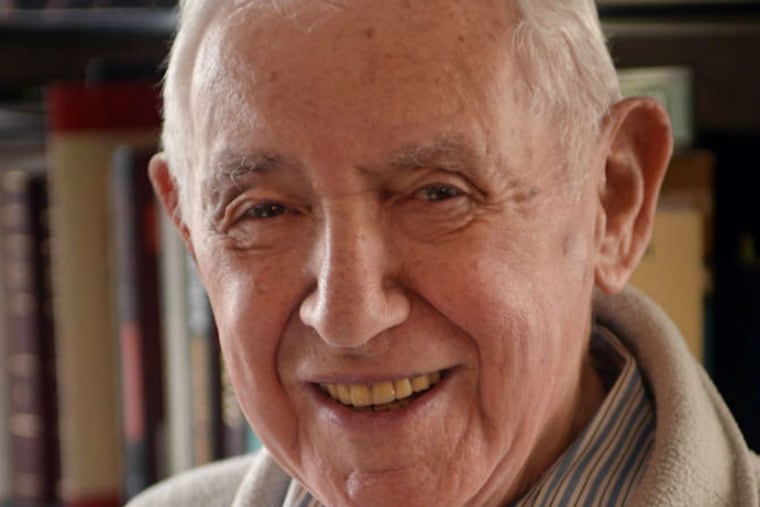David S. Wisnia, 94, Holocaust survivor and cantor known for his deep baritone
Mr. Wisnia sang for the Nazis at Auschwitz-Birkenau, his voice keeping him alive there for three years.

In the beginning, in Poland, David Wisnia sang in opera houses and dreamed of stardom. In the dreaded in-between, he sang to survive, so the Nazis at Auschwitz-Birkenau wouldn’t kill him for being Jewish. And toward the end, Wisnia sang to nurses and doctors, and to his children and grandchildren, so they would always remember.
“Music was my life,” Wisnia once said.
Cantor David S. Wisnia, who survived three years at that notorious death camp, died on Tuesday, June 15, at The Brunswick at Attleboro, a senior facility in Langhorne, after declining health. He was 94.
“It’s so hard to sum him up because he was such a big personality, such a large character. It made him such a joy to be around,” said Avi Wisnia, one of Mr. Wisnia’s five grandchildren. “It was like there was some kind of magic around him and it made people fall in love with him and, in turn, he loved everyone that he met. Most of all, though, when I think about his life, the thing that runs through it is music.”
Mr. Wisnia, who loved hot soup and fancy cars, according to family, was born Aug. 31, 1926, in Sochaczew, about 40 miles west of Warsaw, in Poland. He attended the Yavneh-Tarbut Hebrew School System, where he learned multiple languages and received the vocal training from renowned cantors that would stay with him for life. His parents, Eliahu and Machla, later moved the family to Warsaw, where Mr. Wisnia sang in synagogues, theaters, and on Polish radio.
“He was very proud of how he was trained and the style in which he sang, which blended Jewish tradition with a very operatic style,” his grandson said.
When Germany invaded Poland in 1939, the city’s Jewish population was rounded up and crammed into an area that became known as the Warsaw Ghetto. Mr. Wisnia’s parents and a younger brother, Dov, were murdered. His older brother, Moshe, disappeared and was never seen again. Mr. Wisnia was captured and taken by cattle-car to Auschwitz-Birkenau.
At first, it was Mr. Wisnia’s fellow prisoners who asked him to sing, to brighten their spirits in such a dismal place. Then the Nazi guards heard him, too, and forced him to perform for them.
“He would entertain them at their drunken parties, after their workday, where they committed their horrible acts,” Avi Wisnia said.
Mr. Wisnia, a longtime Levittown resident, composed two songs in Auschwitz, one in Polish, “Oswiecim” (Auschwitz), and another in Yiddish, “Dos Vaise Haizele” (The Little White House in the Woods). Both are on display at the Holocaust Museum in Washington, D.C. In 2019, the New York Times told the story of Mr. Wisnia’s brief love affair with fellow prisoner Helen Spitzer while both were held in Auschwitz.
“For a few months, they managed to be each other’s escape, but they knew these visits wouldn’t last. Around them, death was everywhere,” the Times reported.
Mr. Wisnia was transferred to Dachau and, in December 1944, escaped into nearby woods and was rescued by the American 101st Airborne Division. Joining with the 506th Parachute Infantry, he was adopted as their “Little Davey” and worked as an interpreter and engaged in combat during the war’s closing days. Mr. Wisnia detailed his life story in a memoir, One Voice, Two Lives: From Auschwitz Prisoner to 101st Airborne Trooper.
Mr. Wisnia moved to the United States in 1946 and worked as an encyclopedia salesman for the Wonderland of Knowledge company. Mr. Wisnia and his late wife, Hope, later moved to Bucks County, where he served as cantor of Temple Shalom in Levittown for 28 years, then cantor at Har Sinai Hebrew Congregation of Trenton for 23 years. In retirement, Mr. Wisnia often spoke about the Holocaust to schools and sang in Argentina and Poland. He returned to Auschwitz for both the 70th anniversary of the liberation of the camp and last year’s 75th anniversary event, accompanied by family. He sang at both events.
During last year’s trip, Mr. Wisnia performed with Avi, also a musician, at the POLIN Museum of the History of Polish Jews in Warsaw.
“We performed to a packed house with a beautiful piano,” Avi Wisnia said. “It was like he became the star of Poland he was always meant to be.”
Mr. Wisnia is survived by his two sons and daughters-in-law, Rabbi Eric and Judith Wisnia, Michael and Misa Wisnia; two daughters and sons-in-law, Karen Wisnia and Kirk Wattles, Jana and Lee Dickstein; and three other grandchildren. One grandchild predeceased him.
In lieu of flowers, the family asks that donations be made to the Auschwitz-Birkenau Memorial and Museum.
Arrangements are private but a public memorial will be held at a later date.